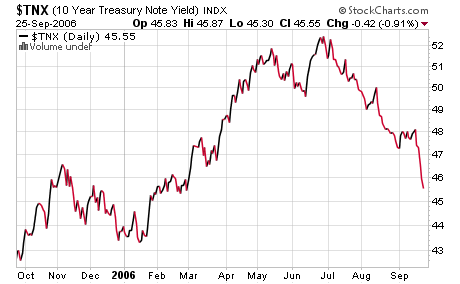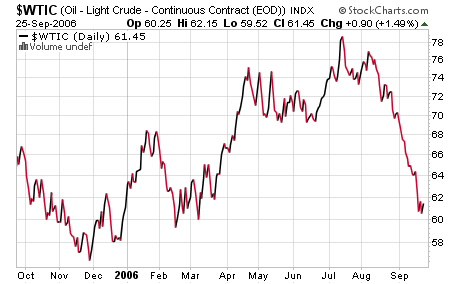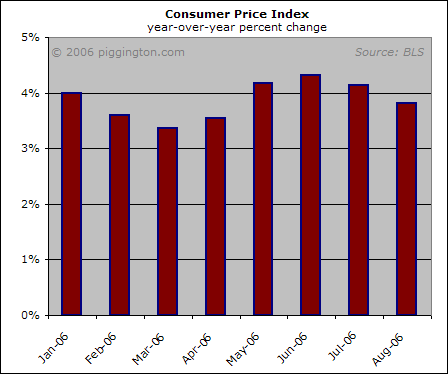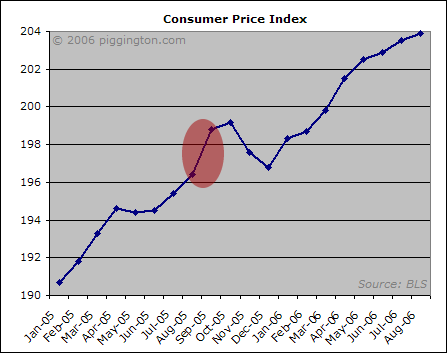Sorry about the radio silence this past week… I’ve been real busy getting the new portfolio management/financial advisory gig* off the ground**. What writing I did get a chance to do over at the voiceofsandiego.org concerned the Amaranth blowup, not housing, so I didn’t link to it from here.
Now I am compelled to come out of hiding because of bond yields.
I made note a while back when the yield on the 10-year Treasury Note finally crossed the elusive 5% mark. The 10-year yield eventually rose to 5.24%, but as the below chart (courtesy of StockCharts.com) shows, it went into freefall soon thereafter.

What’s going on? It seems that the markets, and the Federal Reserve along with them, have gotten it into their collective head that the housing slowdown will cause an economic slowdown, which will in turn reduce inflation. As if to confirm this viewpoint, the market’s inflation harbingers—commodities—have gotten smacked around pretty hard, as the following chart of the oil price indicates:

I personally am very skeptical of this line of reasoning. Due to our tremendous deficit spending, the CPI (Consumer Price Index) inflation is heavily influenced by import prices. A slowdown here would not necessarily cause import prices to decline. As a matter of fact, import prices might rise if the dollar falls due to Fed rate cuts (which would reduce the yield advantage that the US$ has over other currencies) or to a declining confidence in the US economy. Rising import prices could easily offset the effect of a consumer slowdown on price inflation.
The decline in commodities could help ease inflation pressures, but the steepness of the price drop indicates that it has been driven less by supply and demand than by the "hot money" speculators being shaken out of the sector. If this is the case, prices could eventually start to creep up again as investors re-enter the commodities market.
Either way, there is scant evidence that inflation has subsided as of yet:

However, note that September 2005 featured a Katrina-inspired spike in the CPI:

For this reason, September’s year-over-year CPI comparison will likely look nice and tame, bolstering the market’s opinion that inflation has been vanquished. I believe this idea will eventually prove illusory, and that rates will rise again—but for now the inflation-is-dead crowd remains at the helm.
How this all affects the housing market is another topic entirely, and one that I will address in the near future.
* Regulations require that when I mention my vocation, I also mention that investment advisory services and securities are offered through Girard Securities, Inc., member SIPC/NASD.
** Incidentally, for those who expressed interest, the business is now fully operational… but the website is still in progress.

Regarding the bond market
Regarding the bond market here is something else to consider;
CORNERING THE BOND MARKET?
U.S. Treasury officials are examining possible manipulation in the Treasury bond market, noting a sharp increase in trading volume over the last two years and the increasing temptation to profit from a squeeze.
It is an issue the Treasury first looked at in 2004, when short-term rates first began to bounce back. In Treasuries, prices move in the opposite direction as rates. In a squeeze, a dealer corners the market on a specific issue, forcing prices higher as demand builds and dramatically lowering the interest rate.
“Over the last two years, we have witnessed an increase in trading practices in the cash, repo and futures markets for U.S. Treasury securities that have raised questions for the U.S. Treasury and the regulatory agencies that monitor these markets,” said Deputy Assistant Secretary for Federal Finance James Clouse in a speech Wednesday at the Bond Market Association meeting in New York.
Not all money is used to
Not all money is used to consume this business’s products by paying his prices. In the real world this system depends on the ongoing creation of new loans, which means ever-increasing debt to the borrowers. I think there are psychological limits to the total amount of debt humans can tolerate. We get to this point then we pull back and everybody tries to suck money out of the system to payout their debts.
Richard from http://britainloans.co.uk/